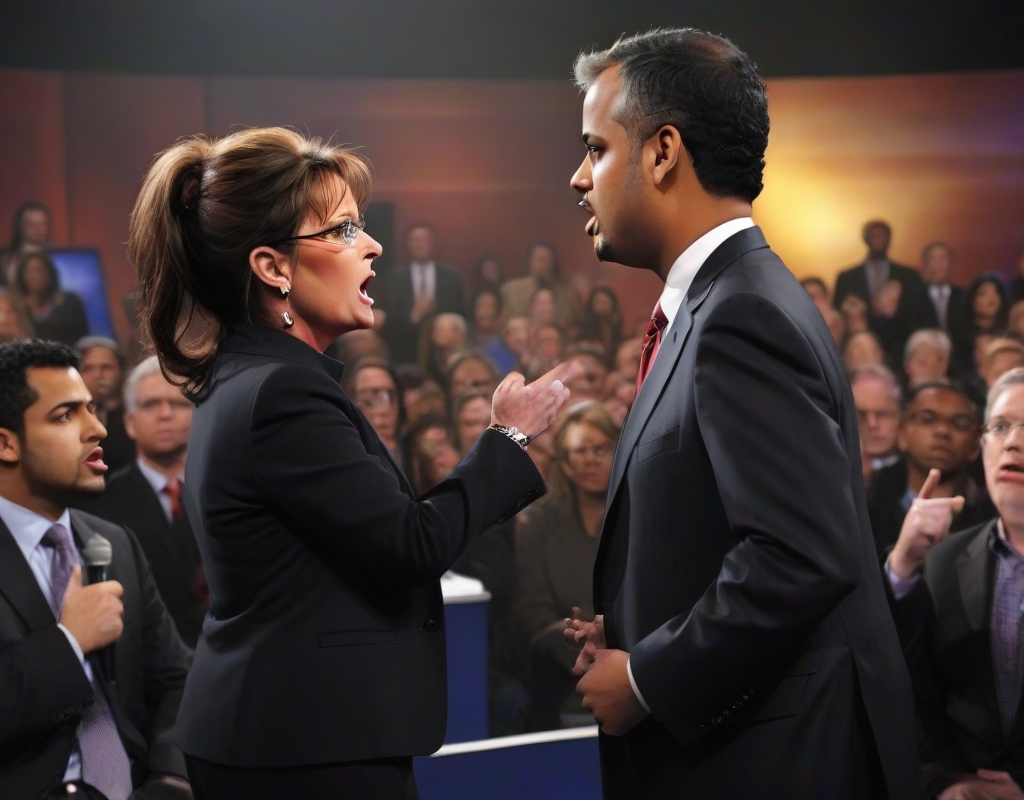In a recent and highly charged episode of “Piers Morgan Uncensored,” Sarah Palin and Mehdi Hasan engaged in a fiercely contentious debate that showcased the polarized nature of current political dialogue. The episode captured significant attention due to the volatility of the exchanges and the controversial topics discussed, particularly regarding energy policies under Donald Trump and Joe Biden’s administrations and issues around racial rhetoric.
**The Core of the Debate**
The primary disagreement between Palin and Hasan centered on the effectiveness and impact of the energy policies from the Trump and Biden administrations. Palin, a vocal advocate for Trump’s policies, argued that they fostered energy independence and stimulated economic growth. She contended that Biden’s approach has led to increased energy prices and heightened dependence on external oil sources. Hasan, known for his robust interviewing style, challenged Palin to substantiate her claims with detailed data and evidence, which led to visible tension.
**Escalating to Accusations**
The debate escalated as Hasan broached the subject of race, confronting Palin with accusations of racism based on her previous public comments about Barack Obama and her descriptions of Black Lives Matter protesters. Palin strongly refuted these claims, insisting that her comments had been misconstrued or taken out of context. However, Hasan persisted, citing various sources that had criticized Palin’s language, portraying her views as potentially indicative of a dismissive stance towards racial justice.
**Verbal Spar and Host Intervention**
The interaction deteriorated into a heated exchange of personal insults, with Palin labeling Hasan as “obnoxious” and accusing him of lying, while Hasan reiterated his accusations of racism. Piers Morgan, the host, faced challenges trying to mediate and redirect the conversation towards a more constructive dialogue, but the attempts largely fell on deaf ears as the participants remained entrenched in their positions.
**Public and Media Reaction**
The aftermath of the broadcast saw the debate becoming a focal point on social media and other platforms, sparking a broader discussion about the state of political discourse in the United States. Many expressed dismay at the personal attacks and the confrontational nature of the exchange, perceiving it as a reflection of the increasing toxicity in political interactions.
**Analyzing the Broader Implications**
The debate on energy policy reflects the starkly different paths advocated by the Trump and Biden administrations. Trump’s policies emphasized boosting domestic oil production for independence, while Biden has advocated for sustainable practices that, according to critics like Palin, could have negative short-term economic impacts.
The racial elements of the debate underscore the sensitivity and complexity of discussing race in America, where accusations of racism can profoundly impact the discourse, often overshadowing other discussion points and solidifying polarized views.
**Expert Perspectives and Cultural Reflections**
Media analysts and experts have offered mixed reviews of the altercation, with some seeing it as a degradation of civil discourse and others as a raw demonstration of current political realities. The emphasis on conflict-driven dialogue in political media might engage viewers but can detract from substantive discussions.
**Concluding Thoughts**
The fiery exchange between Sarah Palin and Mehdi Hasan on “Piers Morgan Uncensored” serves as a stark reminder of the deep divisions and emotional intensity that characterize much of today’s political landscape. Such episodes highlight the vital need for more nuanced and respectful dialogue in public discourse, challenging both the media and participants to foster more thoughtful and less adversarial conversations. This event not only reflects the sharp ideological divides but also prompts a critical examination of how such debates are conducted and the role of media in shaping public perception. As society continues to navigate these complex issues, the imperative for balanced and constructive political engagement becomes increasingly apparent.




